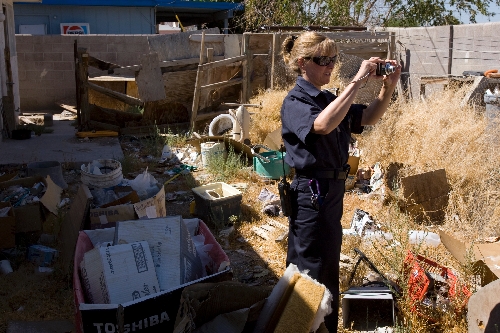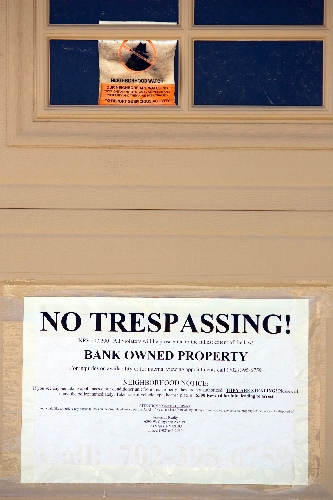Ideally, you’ll find owners at home
It's conventional wisdom that owner-occupants treat their property better than landlords and tenants would, and also form closer relationships with neighbors. But academics have taken the trouble to prove it, and its clearly visible in several greater Las Vegas neighborhoods where many homes are investor-owned.
Lewis Spellman, a University of Texas professor who has written on the impact of rentals on single-family neighborhoods, and George Galster, professor of Urban Affairs at Wayne State University in Detroit, both said studies have shown homeowners take better care of private property and common areas of a neighborhood than out-of-town landlords or their tenants.
"People who buy homes would prefer to have other homeowners as their neighbors, and they are willing to pay a premium to live in a neighborhood where they will have homeowners as neighbors," Galster said. "The reason for that, studies show, is that homeowners take better care of their dwellings than absentee owners, and because they engage in formal and informal activities" more than tenants do, such as Neighborhood Watch, homeowner-association elections and block parties.
David Boesch, president of the Highland Hills Homeowners Association, which represents about 500 homeowners in North Las Vegas, and Tommie Bush, representative from the Rancho Del Sol Homeowners Association in North Las Vegas, echoed those sentiments.
They said homeowners have grown more frustrated in recent years with an increasing number of rental or empty homes. Neighbors complain about overgrown and burnt-out lawns, cars parked in front yards, broken sprinklers and other landscape matters, Boesch said.
Owners who live in the homes usually comply with notices from the association, but about half the absentee owners do so. Some landlords don't comply even after they're fined, he said.
"It appears that most (landlords) are willing to pay the fine rather than mess with the tenant," Boesch said. "I get the feeling, overwhelmingly, that they have moved out of the area and don't care any more. ... They have left Las Vegas, and they have turned their home into a business enterprise."
In Bush's neighborhood, about 25 of the 79 households are involved in Neighborhood Watch and other neighborhood activities, she said.
For Bush and many of her neighbors, their homes were their largest investments, and it's a shame to see the neighborhood start to crumble around them, she said.
"I like my neighborhood, but I don't like what is happening to it," said Bush, a retiree who refused to divulge her age. "When you have raggedy, old cars parked in front of the house and people not taking care of their grass and people not taking care of their trash, it takes what was a nice, family neighborhood and brings it down, and it brings down values as well."
Heather Nordin, 46, a former casino supervisor who has been looking for work for 18 months, is trying to sell the home she purchased new in 2004, in a neighborhood near Commerce Street and Centennial Parkway. She hopes to sell it for about a third of what she and her husband paid for it, she said.
Like most others, Nordin blames tumbling home values and the foreclosure crisis on the banks first, but says out-of-town investors who own neighboring homes, and the tenants in those homes, are not helping matters.
"The property values have dropped, and it has nothing to do with renters, but it doesn't help to have people yelling at each other at night and to have cars whipping up and down the street," Nordin said. "If people want to buy a house, they want to stay there for the long run, but they, every time they turnaround, don't want to see more and more rental homes," Nordin continued. "You try to make bonds with the people around you, but you can't when neighbors are moving in and out all the time."
Down the street, a tenant who identified himself only as John, said he moved there less than three years ago after he lost his home of 15 years to foreclosure. He said other landlords wanted $1,300 or $1,400 monthly, about the same as his mortgage. He leases his home for $995 a month.
John moved to that neighborhood, he said, because his wife can walk their children to a nearby school and because he wanted a garage so he can work on cars. However, he doesn't like leasing, he said, in part because he needs permission from the homeowners association to own a pet or put up an umbrella or above-ground pool in his backyard.
"It was better when I had my own home. We had a big backyard where my kids could play," he said. "My kids made friends at our old house, but we don't really know anybody over here."
John also regrets that his children have started speaking in the hip-hop-related slang they hear from neighborhood kids.
"They do get an attitude from the place where they live," he said.
North Las Vegas police spokesman Tim Bedwell, who in the past was a patrol sergeant in the area north of Alexander Road, said throngs of investors bought brand-new homes in the Aliante area between 2003 and 2006 and immediately rented them out.
Some of the tenants were among approximately 9,000 households in Clark County that receive Section 8 rental assistance from the federal government. Data from the Southern Nevada Regional Housing Authority show that the Southern Nevada zip codes with the most Section 8 households lie in that part of North Las Vegas.
"The neighborhoods that sprung up, and where investors bought the homes for an investment, make the area more transient and it changes the (neighborhood) dynamic," Bedwell said.
Some homeowners are quick to identify undesirable tenants with the Section 8 program but are not necessarily correct, Bedwell said.
"I think there is an unfounded fear of Section 8, but I think there certainly is a correlation between the number of nonowner-occupied homes and crime. In other words, you have a lower crime rate when you have owner-occupied homes," he said.
Crime north of Alexander Road has dropped about 15 percent since last year, Bedwell said, in part because dozens of homes that once housed renters are now empty and in foreclosure, he said.
Michael Rodriguez, spokesman for the Clark County School District, said the transient nature of Southern Nevada's student body influences planning at many schools.
"It affects everything we do with regard to planning. When we look at zoning schools, we look at the type of housing around each school," Rodriguez said. "Obviously, if we have a lot of homes that are not occupied by the owner, there would be more student variations throughout the year. ... You do, potentially, have rapid change. One year a home is being rented by a family with no kids, and the next year it is rented to a family with four kids."
District officials have never examined the dropout population to see what percentage came from rental housing, but Rodriguez said student performance depends on stability in life and parental involvement.
"You are trying to give them the best educational experience, so (a fluctuating student body) affects staffing, the number of portables (classrooms) and whether a school is year-round or not," Rodriguez said.
LaVerne DeMontiney, 49, who has leased a home for two years near Centennial and Commerce, said she had no intention of buying a home when she moved to Las Vegas 26 years ago, and that she still prefers to lease even though she qualifies for a Veterans Administration home loan.
"I never bought a home because I never planned on staying in Las Vegas," DeMontiney said. "It's because of the growth, the bad schools and the bad job market."
DeMontiney, who works the graveyard shift in a stockroom at Nellis Air Force Base and has two children in middle school, said her kids no longer get involved in sports or other activities like they did when they lived at their previous rental home.
"I don't know my neighbors," DeMontiney said. "I have never gone over to their houses and they have never come to my house."
Contact reporter Frank Geary at fgeary @reviewjournal.com or 702-383-0277.
Owner-occupied houses decrease in Las Vegas
RELATED STORIES
• Who's living there? Owner-occupied houses decline in Clark County
• Assessor's numbers used for analysis
























